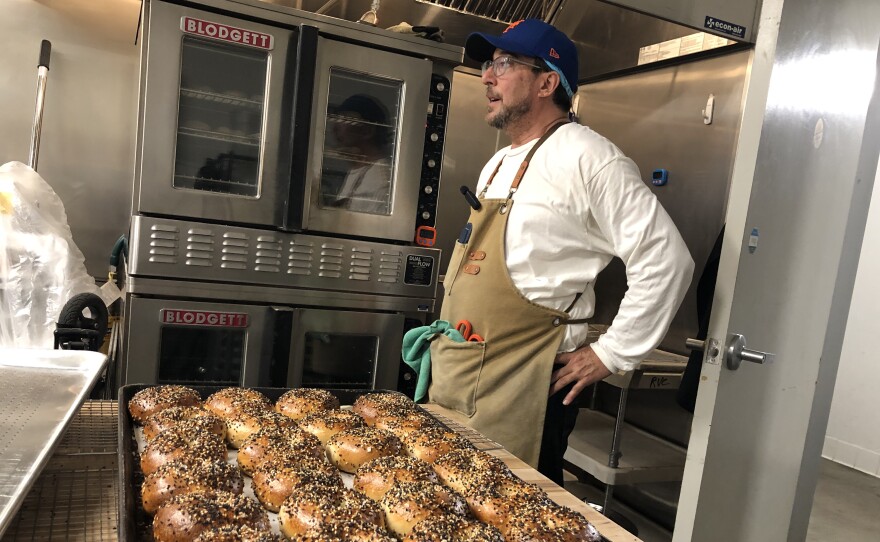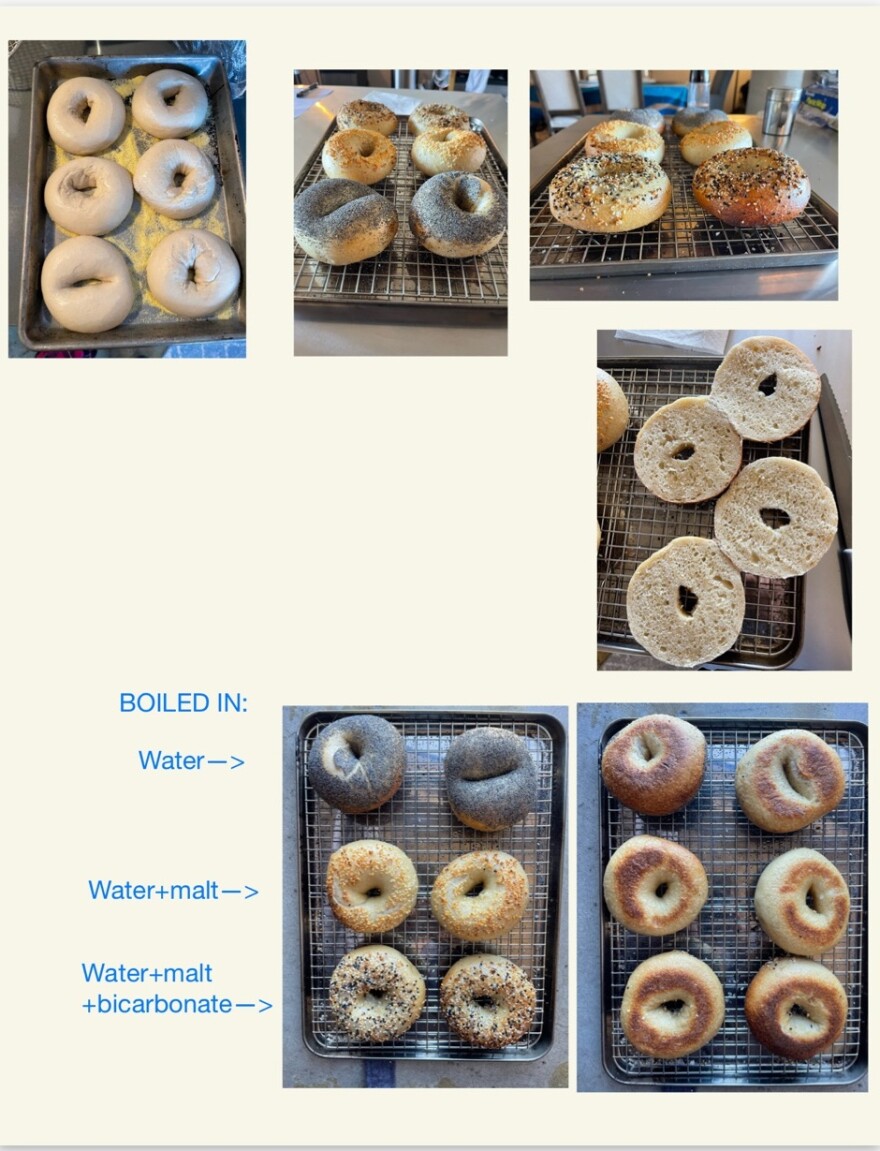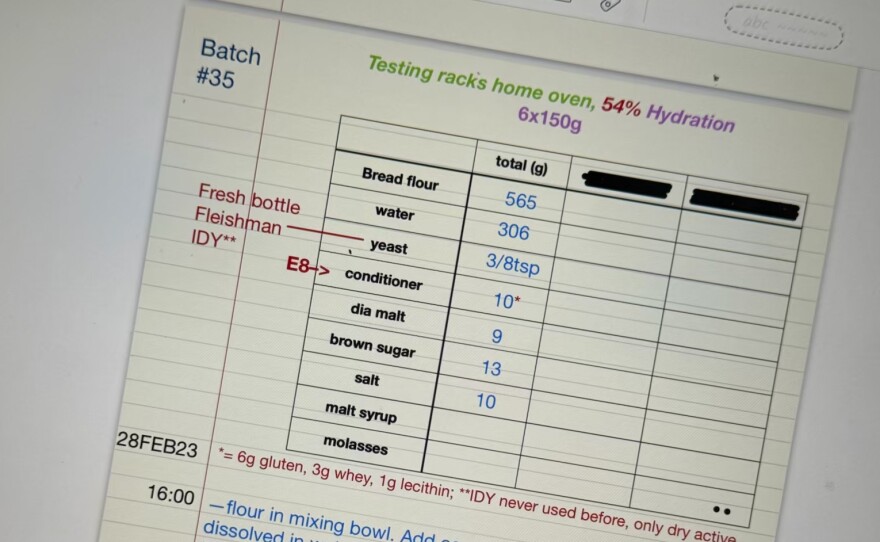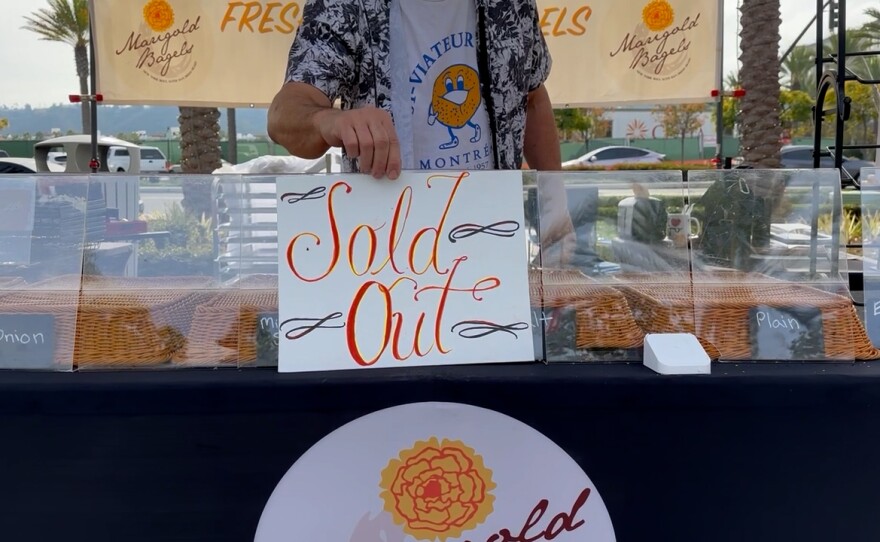On Dec. 29, Marigold Bagels sold its last bagel at the Mission Valley Farmers Market in Civita Park. But don't panic! The popular New York-style bagels will still be available online and will return later this year to Civita Park and to a new storefront in North Park.
My friend introduced me to Marigold Bagels by sneaking one in a brown paper bag into a cinema on a Sunday morning. In the dark, I tore apart the bagel, ate it plain, and was immediately impressed. So impressed that I got up at 4 a.m. (that's actually a late start for a bagel maker) on a Saturday morning to find out how these amazing bagels were made.

Going viral
Mike Rabinowitz, founder, owner and sole bagel maker at Marigold Bagels, wanted to bring New York-style bagels to San Diego. He began making them in his home kitchen — 138 bagels cold-fermented in his refrigerator, leaving little room for food, so he ate out a lot. Then he expanded to a professional kitchen and has been selling bagels online and at Civita Park for almost two years.
But back in November, a TikTok video from a loyal customer ignited a change.
@sade_renee Marigold Bagels saturday at the Civita Farmers market in Mission valley. If you want a great bagel this is where you get it from. #sandiego #sandiegohiddengems #sandiegofood #newyorkbagels
♬ original sound - Sade Renee
"She said, 'Mike, I just posted this, you better get ready.' Well, it turns out she had over 20,000 followers in San Diego, and it went viral. And then, the next time we showed up at the market, we went from maybe 20 people in line at any given time to, we counted about 250," Rabinowitz recalled.
This prompted Rabinowitz to ramp up to full capacity.
"When I say full capacity, I mean literally as much as I can carry in my truck. I can't carry one more tray of bagels," Rabinowitz said.
This, of course, made me wonder if he might need armed guards to protect the precious and very limited cargo.

Even at full capacity, he was making only 580 bagels. That meant a lot of people left without any bagels, and Rabinowitz felt awful. So, for the final weeks of 2024, he instituted some new policies: a limit of seven bagels per person and a deli ticketing system to manage customers' expectations. Green numbers meant you were guaranteed a bagel, yellow numbers meant maybe and red numbers meant you were unlikely to succeed in your quest for a Marigold bagel.

He also ramped up online sales, but trying to get a bagel became akin to trying to get a Comic-Con badge.
"I would say within five to seven minutes, they were all gone," Rabinowitz said. "And that produces a lot of very unhappy people who are online fighting everyone else online. Even though I knew we'd get a storefront eventually, it became all the more important to do so quickly because we can go from baking and selling twice a week to every day of the week."
That will be a big relief. Of course, it also means hiring more people, doing more work and making a lot more bagels at a location completely dedicated to his business. He pointed out that he lost an entire batch of bagels once because someone sharing the community fridge took his trays out and left them in the hallway. They overproofed, ballooned and became unusable. But that kind of kitchen disaster won't happen at his new storefront, which is why he is excited about the future of Marigold Bagels.

What makes Marigold Bagels so special?
Matt Eisenberg was in line by 7:45 a.m. on a chilly Saturday morning last month to make sure he got a bagel.
"I was born in New York. My parents are from New York, and I've been having his bagels for over a year now," Eisenberg said. "It's really hard to find a perfect bagel. His everything bagel is delicious. He's tried things with za'atar, which is a really delicious type of seasoning. They really live up to the hype: The freshness and the doughiness. They are authentic New York bagels."
And that was Rabinowitz's vision — to bring authentic New York bagels, the ones he remembered as a kid, to San Diego.
"The best ones are high gluten, they're baked the same day, they have a bit of a chew to the crust, but a soft sort of mouthfeel," Rabinowitz explained. "When I was a kid growing up on Long Island, the bagels were very similar to what I make now: the crispy crust, the high gluten, little bit smaller, blistered surfaces from the long cold ferments. I watch David Tamarkin’s video all the time because what he said rang true. His comments were identical to the guiding principles at Marigold Bagels when we started."
@simonandschusterbooks Editorial Director David Tamarkin's hot take on New York City bagels may surprise you! Find out how to make real bagels in King Arthur's BIG BOOK OF BREAD. #bagels #hottakesonly #booktok #publishing
♬ original sound - Simon & Schuster
And with the storefront, Rabinowitz wants to create something else authentic: "I want to sort of recreate what you could have found many years ago on the Lower East Side of New York. Big baskets of bagels and offer the real sort of classic New York bagel sandwiches, which among other things involve different kinds of cream cheese, and smoked or cured fish, like lox. So, it gives people the feeling that they're actually at a bagel shop in New York."

Actually, it's not the water
As a New Yorker, Rabinowitz is familiar with the adage that it's the New York water that makes the bagels so special. But as a recently retired organic chemist, he wasn't going to accept that as fact. So, at JFK Airport in New York, he smuggled some New York tap water home and conducted a scientific test with six self-defined foodie friends.

"I made three batches of bagels exactly the same way, except one had New York tap water, one had San Diego tap water and the other one had the soft water we use, and just made plain bagels. We did a blind taste test, and people had a lot of opinions, but there was no consensus on what the best bagel was. I could tell the difference between the San Diego tap water and the New York tap water, but I couldn't tell the difference between New York tap water and the filtered reverse osmosis water that we use," Rabinowitz explained.
His background in organic chemistry turned out to be surprisingly useful in the kitchen.

"Organic chemistry really involves working in the laboratory and controlling temperature, time, humidity and the way you add — we call them starting materials and products — but here, they're ingredients," Rabinowitz said. "The way you add them, the quality of what you use, that's all drilled into your head about how you do chemistry. And it turns out that all those things are important in baking. I'm not and never was trained as a baker. I would call myself a bagel maker."
That meticulousness shows in his process.

"I have hundreds and hundreds of test batches and pages in a notebook," Rabinowitz said. "Each one describes how I made it, the batch, the ingredients I used, where they're from, times and temperatures, pictures, and then the final results of what I thought of it and what I thought could be improved. Eventually, I got to the recipe we follow now and the techniques we follow now."
Rabinowitz's passion for bagel-making extends beyond the science.
"I could talk about this forever, so it gets a little dull," he joked.
It might be dull, except that Rabinowitz's enthusiasm for the art and science of making a bagel-making is contagious. Plus, he offered me a za'atar bagel fresh from the oven, which I tore apart and dipped in a specialty cream cheese made by Courtney Schwatrz, his business development and marketing manager. She was drawn into the kitchen by Rabinowitz's passion.

When Rabinowitz retired, he never expected to be up and making bagels by 3 a.m. or on his feet for nearly eight hours on baking and sales days. The repetitive motion of rolling and twisting the dough has even given him tendinitis, a move he likened to a screwball pitcher.
But is there a secret ingredient or technique that makes Marigold Bagels so special?
"There's no secret recipe," Rabinowitz stated. "I don't use anything that no one else uses. I don't use any technique that no one else uses. What I did do was assimilate lots of ideas from people I saw online, books I read, articles I read and cookbooks. I took what I thought were the best ideas and discarded the ones that I thought were terrible — and there there were quite a few — and slowly developed this. I don't use dough enhancers. I spent my time just using the basic ingredients that we use: high protein wheat flour, barley malt, malt syrup, cane sugar, salt, yeast. That's pretty much it. And I think it's a better product for it."
Rabinowitz, who has self-financed his business, never started Marigold Bagels to make money.
"It was honestly about bringing something to San Diego that I thought would add to the richness of the food scene," he said. "I thought that this could add a little variety to the bagels available in general. When I hear from customers and on Instagram about how much they like the bagels, that probably gives me more happiness than selling the bagels themselves."

Marigold Bagels plans to continue selling bagels online with pick-ups in Point Loma, and possibly more locations in the future. While they've paused appearances at the Mission Valley Farmers Market, they plan to return. Their storefront, located in North Park near El Cajon Blvd. and 30th Street, is expected to open in May or June.





